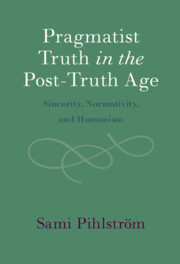Book contents
- Pragmatist Truth in the Post-Truth Age
- Pragmatist Truth in the Post-Truth Age
- Copyright page
- Epigraph
- Contents
- Acknowledgments
- Introduction
- Chapter 1 James’s Children?
- Chapter 2 Religious Truth and Pluralism from a Pragmatist Point of View
- Chapter 3 Around or through Kant?
- Chapter 4 The Will to Believe and Holistic Pragmatism
- Chapter 5 How Is Normativity Possible?
- Chapter 6 Pragmatic Agnosticism – Meaning, Truth, and Suffering
- Conclusion
- References
- Index
Chapter 4 - The Will to Believe and Holistic Pragmatism
Published online by Cambridge University Press: 14 September 2021
- Pragmatist Truth in the Post-Truth Age
- Pragmatist Truth in the Post-Truth Age
- Copyright page
- Epigraph
- Contents
- Acknowledgments
- Introduction
- Chapter 1 James’s Children?
- Chapter 2 Religious Truth and Pluralism from a Pragmatist Point of View
- Chapter 3 Around or through Kant?
- Chapter 4 The Will to Believe and Holistic Pragmatism
- Chapter 5 How Is Normativity Possible?
- Chapter 6 Pragmatic Agnosticism – Meaning, Truth, and Suffering
- Conclusion
- References
- Index
Summary
The "will to believe", introduced by James in his 1897 essay with the same title, is presumably one of the most famous - or, according to some, notorious - ideas in pragmatist philosophy of religion. This Jamesian strategy of argumentation can be extended from the philosophy of religion to other "existential" matters, including the question concerning the freedom of the will. By considering the will to believe argument and interpreting it in the context of holistic pragmatism, this chapter continues the discussion of pragmatist philosophical anthropology and individualism (started in the previous chapters) and thus provides novel perspectives on the notion of pragmatist truthfulness and truth-seeking in worldview-related (including ethical and religious) matters. The will to believe is, furthermore, explored (holistically) in terms of vice- and virtue-epistemology, drawing attention to the role it may play in a self-critical development of an individual's doxastic character. The concept of sincerity thus again turns out to be crucial to a proper understanding of not just the pursuit of truth generally but of the will to believe as well.
Keywords
- Type
- Chapter
- Information
- Pragmatist Truth in the Post-Truth AgeSincerity, Normativity, and Humanism, pp. 101 - 143Publisher: Cambridge University PressPrint publication year: 2021

